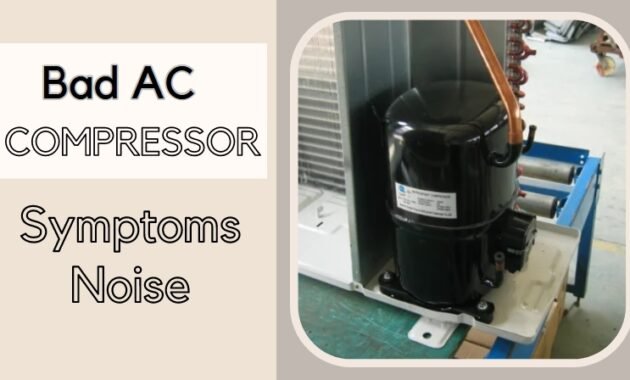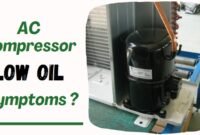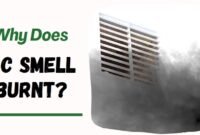The AC compressor is a vital component in your home’s cooling system. When it functions correctly, it’s easy to forget its existence as we enjoy the cool air it provides. However, it’s a clear call for attention when noise-related issues arise.
These noises are more than just disturbances; they are signals, indicating potential problems that can disrupt our comfort. Awareness of these sounds and their implications is crucial for every homeowner.
Addressing them promptly ensures that the cooling system remains efficient, preventing unexpected breakdowns and providing a comfortable living environment throughout the year.
Bad AC Compressor Symptoms Noise: What It Indicates
The AC compressor is the backbone of your cooling system, responsible for circulating refrigerant and ensuring the efficient cooling of your home. When it starts to falter, it often sends out auditory signals.
These noises, ranging from buzzing and hissing to loud clanking, are not random. They are clear indicators of underlying issues. A buzzing noise, for instance, might hint at electrical problems, while a hissing sound could be a sign of a refrigerant leak.

On the other hand, loud clanking noises might suggest worn-out internal parts, signaling the need for immediate attention. Ignoring these auditory cues can lead to more severe problems, escalating repair costs, and even complete system breakdowns.
Read also: Why Your Air Conditioner Compressor Won’t Start
7 Signs of a Bad AC Compressor Bearing
Zooming into the specifics, let’s shed light on the seven signs indicating a bad AC compressor bearing. When it starts to deteriorate, it manifests in several noticeable ways:
Symptoms of a Bad AC Compressor
| Symptom | Description | Indication |
|---|---|---|
| Loud Noises | Unusual sounds like banging, rattling, or clunking | Internal component issues, motor failure |
| Reduced Cooling Efficiency | AC blowing warm air or not maintaining temperature | Ineffective refrigerant circulation |
| Hard Starting | Difficulty in turning on, frequent starting issues | Compressor motor problems, electrical issues |
| Tripped Circuit Breaker | Circuit breaker trips frequently | Overheating, electrical fault |
| Compressor Not Turning On | Compressor fails to start | Electrical problems, complete compressor failure |
● Buzzing Noise
A persistent buzzing from your AC unit is a potential red flag, signaling underlying electrical issues within the compressor.
Electrical disruptions can lead to inefficient cooling, increased energy consumption, and, in worst-case scenarios, complete system failures. Addressing this buzzing early can prevent more significant complications down the line.
● Banging or Clanking
Alarming sounds like banging or clanking are hard to ignore. They typically suggest that internal parts, possibly pistons or crankshafts, are either loose or have broken down. Such issues can drastically reduce the efficiency of the compressor, leading to uneven cooling and increased wear on other components.
● Rattling or Ticking
While these might seem benign, they often indicate loose hardware or debris accumulation within the unit. Regular maintenance and cleaning can prevent these sounds, ensuring that the compressor doesn’t face undue stress and continues to operate optimally.
From personal experience, one of the first signs of a failing compressor is unusual noise. If you hear loud banging, rattling, or clunking sounds coming from your AC unit, it’s often a clear indicator of a compressor issue.
● Screaming or Hissing
These are sounds you should always pay attention to. A high-pitched scream or a pronounced hiss from your AC unit can indicate high internal pressure or a refrigerant leak. Both scenarios can be dangerous. High pressure can lead to component failures, while refrigerant leaks can pose health risks and reduce cooling efficiency.
● Humming
A subtle yet consistent humming noise might not seem like much, but it can be a precursor to more significant issues.
It often points towards a failing starting capacitor. This component supplies the initial power surge required to start the compressor. A malfunctioning capacitor can lead to startup issues or even prevent the compressor from turning on.
● Warm Airflow
One of the most noticeable signs of a compressor issue is when the AC starts blowing warm air. This could be due to reduced refrigerant circulation, possibly stemming from a bearing issue or other internal malfunctions. It’s essential to address this promptly to ensure consistent cooling.
● Frequent Circuit Breaker Trips
If your AC unit consistently trips the circuit breaker, it signifies trouble. Regular power interruptions can suggest that the compressor is overheating or drawing more power than it should, which can be linked to bearing issues or other internal problems.
Read also: Why is My AC Compressor Overheating and Shutting Off?
Solutions and Prevention
- Regular Maintenance
- Expertise: Schedule regular maintenance checks for your AC unit. This includes cleaning the coils, checking the refrigerant levels, and inspecting the electrical components to ensure everything is functioning correctly.
- Prompt Repairs
- Personal Experience: Addressing small issues promptly can prevent major failures. I once had a client who ignored a minor noise issue, which eventually led to a complete compressor failure. Early intervention could have saved the compressor.
- Professional Inspections
- Having your AC unit inspected by a professional at least once a year can help identify and resolve potential issues before they lead to compressor failure.
Bad AC compressor symptoms noise can be the first indication of a looming problem. By staying informed and attentive to these signs, homeowners can ensure a timely intervention, prolonging the life of their AC unit and maintaining a comfortable living environment.


